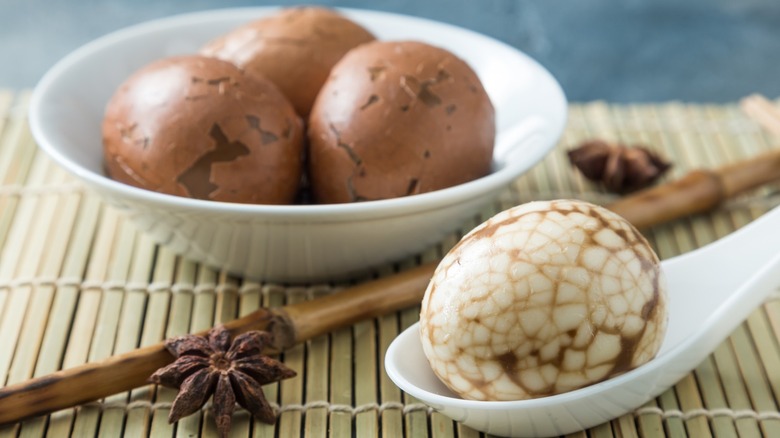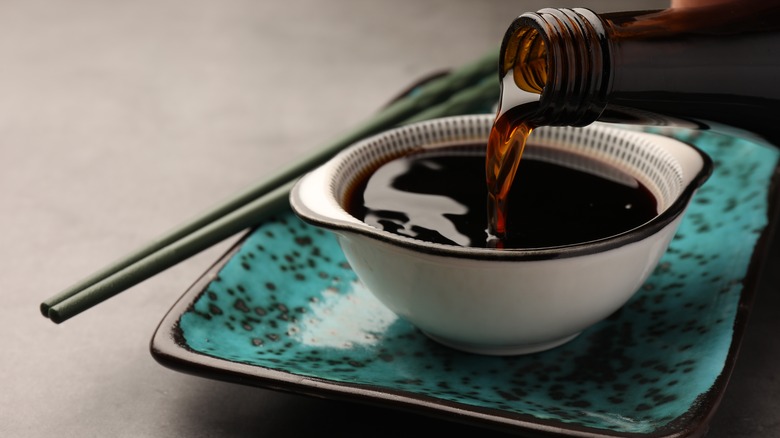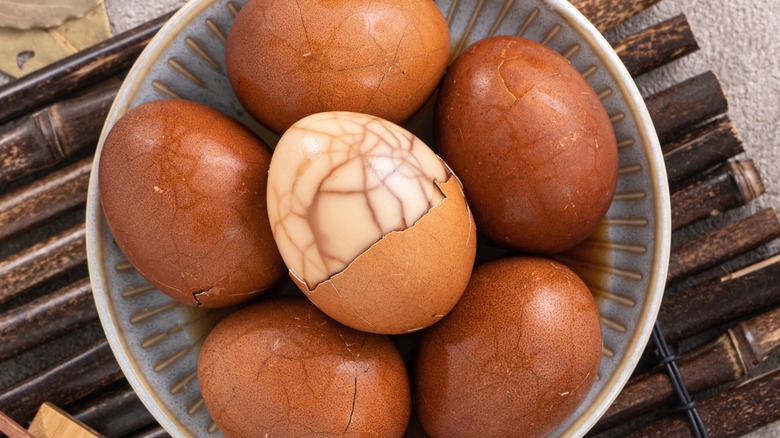Hard Boiled Tea Eggs Are A Savory And Aesthetic Snack You Must Try
Let's face it, hard-boiled eggs can get a bit boring. Sure, they make a tasty snack or a quick protein boost when on the go, but they don't pack a ton of flavor. Enter hard-boiled tea eggs. They're similar in texture to regular hard-boiled eggs, but pack a big flavor punch. Tea eggs are quite common in several Asian countries, but their popularity is slowly making its way over to the United States. Tea eggs originated in China and are now enjoyed as a street food snack in countries like Taiwan and Indonesia, as well as throughout Southeast Asia. Even though tea eggs can be served at any time of day, they're often served as a morning treat.
A tea egg gets its name because it is first marinated in a combination of tea, soy sauce, and spices. Not only does the flavor infuse into the egg, but the colors permeate the shell, leaving you with a beautiful-looking brown-tinged orb. The eggshell is slightly cracked during the marinating process, allowing the sauce to create a beautiful Faberge egg-type look.
What's in a tea egg?
Every family has their unique take on a tea egg, which means the types of seasoning and tea used tend to vary by person. Soy sauce or dark soy sauce darkens the egg and is a necessity for both salt and umami flavor and color. Red tea, also known as rooibos tea, is commonly used, though some people prefer black or green tea. Lastly, spices are added to give the egg its unique flavor. Depending on the recipe, you'll see a mixture of warm spices like star anise and cinnamon sticks. Some recipes also add garlic cloves, peppercorns, and bay leaves.
Tea eggs have a very savory taste with a hint of tea flavor. Even though the eggs are marinated in a slew of spices, the eggs themselves are not spicy. If you have ever enjoyed a ramen egg, the taste and texture are similar thanks to soy sauce. While some recipes call for the eggs to be hard-boiled, others prefer a softer, jammier egg. The time you'll spend boiling the eggs will vary based on how cooked you want them to turn out.
Unless you're walking around the streets of Asia or at an Asian night market, tea eggs aren't easy to come by. However, you can make them at home by boiling eggs, cracking the shells with a spoon, and soaking them in a flavorful marinade.
History of the tea egg
Tea eggs are a breakfast delicacy throughout Southeast Asia, but legend has it that the eggs originated in Zhejiang Province, China. There are two conflicting origin stories regarding the first tea eggs. The first claims that when archaeologists were excavating sites, they stumbled upon fully intact tea eggs that were 500 years old. The eggs were found next to soul urns, meaning they were used during burial and funeral ceremonies. The second theory dates all the way back to the Qing Dynasty (which spans approximately 1600-1900) when people enjoyed combining tea and fruit. Eggs were a popular snack and were often cooked in the same liquid as the tea, resulting in the first version of a tea egg.
Depending on the country, egg marinades can be vastly different. In Japan, marinated eggs are called ramen eggs, as they are marinated in a ramen broth, typically with pork. Indonesia Telur Asin eggs literally translate to "salt egg." These eggs, which are typically duck or chicken, are marinated in water and salt for several weeks. While tea eggs can be consumed at any time, legend has it that eating tea eggs on Chinese New Year will bring prosperity and gold.


